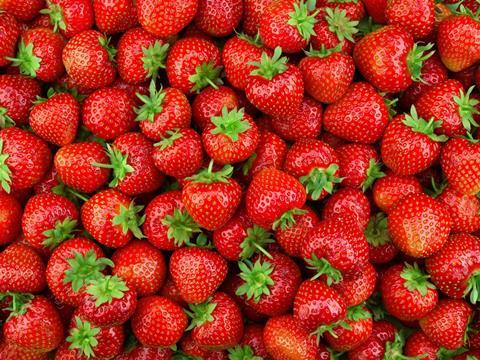
To increase the shelf life of strawberries, researchers at the Thammasat University in Thailand have incorporated cannabidiol, a non-hallucinogenic compound from cannabis known more commonly as CBD and sodium alginate, into an edible, antimicrobial coating that delays the rotting process, according to a report published in ACS Applied Materials & Interfaces by the American Chemical Society.
CBD is popular because of its potential therapeutic effects, but this cannabinoid has also been shown to have antioxidant and antimicrobial properties. In previous studies, CBD limited the growth of some bacteria and pathogenic fungi, such as the ones that cause fresh fruits and vegetables to rot.
However, the oily compound needs to be evenly distributed in water before it can be widely incorporated into foods or used for food preservation. One possible way to do this is to encapsulate the CBD molecules in edible polymers. So, Pongpat Sukhavattanakul, Sarute Ummartyotin, and colleagues wanted to see if a food coating made using CBD-filled nanoparticles could promote antimicrobial activity and extend the freshness of strawberries.
The researchers encapsulated CBD in polyglycolide, a biodegradable polymer used in drug delivery, producing 400-nm-wide particles. They mixed the most stable nanoparticles, containing 20% by weight CBD, with sodium alginate in water. Strawberries were then submerged into solutions containing different amounts of nanoparticles before a second dip into a mixture of ascorbic acid and calcium chloride to turn the colourless coating into a gel.
Untreated and treated strawberries were then placed in open plastic containers at refrigerator temperatures. After 15 days, CBD-treated samples ripened and decayed much more slowly than untreated ones, possibly because of reduced microbial growth.
The coating with the most CBD-loaded nanoparticles preserved the berries’ dark red appearance, enhanced their antioxidant activity the most, and exhibited the largest antimicrobial protection over the storage period, suggesting that this version would lead to the longest shelf life. The researchers say that their results demonstrate how encapsulated CBD could be used to create a colourless antimicrobial coating for active food packaging.
The project received funding from the Thammasat University Research Unit in Textile and Polymer Chemistry and a Thammasat Postdoctoral Fellowship.
This article was created in collaboration with AIPIA (the Active and Intelligent Packaging Industry Association). For a full update on active and intelligent packaging, come along to the AIPIA World Congress (co-organized by Packaging Europe) in Amsterdam on 14-15 November. The only smart packaging event covering the entire technology spectrum, the World Congress is a meeting place for the global active and intelligent packaging industry where brand owners, innovators, and other stakeholders can network and see and discuss the latest trends and innovations. Register to attend here.


















No comments yet